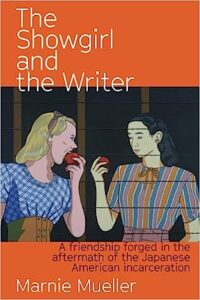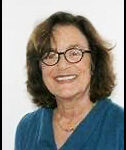Review — THE SHOWGIRL AND THE WRITER by Marnie Mueller (Ecuador)
The Showgirl and the Writer: A Friendship Forged in the Aftermath of the Japanese American Incarceration
by Marnie Mueller (Ecuador 1963-65)
Peace Corps Writers
488 pages
July 2023
$16.95 (paperback)
Reviewed by Eric Madeen (Gabon 1981-83)
•
By turns leaky and frypan, tarpaper roofed, roughshod dormitories imprisoned 18,000 people of Japanese descent by the end at Tule Lake Japanese American High Security Segregation Camp in Northern California from 1942 to 1946.
One degradation followed another, as in the incarcerated being subjected to abominable hole-in-the-wood toilets open side by side all the way down the miserable line. Barbwire topped fences. Armed guards manned watch towers looking down on imprisoned Japanese Americans guilty of no crime. At night the sweep of search lights went back and forth like metronomes. Glazing the whole sad, evil spectacle at Tule Lake concentration camp was a grainy skin of black lava dust, and slathered across the wounded galaxies of this ambitious book is mono no aware, Japanese for a sensitivity to ephemera and the powerful emotions it stirs in us.
Stirring in me now just as I put the book down upon completion, the daze one feels at the end of a movie since one — this one – is often enough still in the movie and incapable of articulating much of anything. Dear Reader, Bear with me: I’m still in the book, a sprawling 461-page swansong that by turns jackknives and cannonballs deep into two marginalized women’s lives, the author’s as a Jewish American born at Tule Lake to Caucasian parents —Mueller’s father orchestrated Co-ops there and after the war a lot of elsewheres, and judging the daughter by the father I can see his idealism thrumming in her, and the showgirl a Nisei, or second generation Japanese American — and in her case half Chinese who took a Chinese moniker so as to evade discrimination piled on Japanese Americans during the war. Mary Mon Toy AKA Teruko Mary Watanabe Okada who, with a turn of luck, was singled out by Eleanor Roosevelt for a scholarship at Julliard when she was released from camp.
The book’s subtitle is telling: A friendship forged in the aftermath of the Japanese American incarceration. Although such incarceration happened in the first half of the 1940s — their relationship didn’t start until the 1990s — the lamentable experience stitches the two together, and even when the minutiae is less granular we can feel author Marnie Mueller, a true empath, feeling her dear friend Mary’s pain where it seems lodged deep in her soul, out of the range of probing; perhaps Mary was following a Japanese kata, or manner/form/way, of not airing one’s laundry in public, to grin and bear it as summed up in the Japanese gaman. Moreover, in my felt sense, I could feel it there in the subtext much as one feels early Hemingway’s Nick Adams’ isolation and walking woundedness up in Michigan after WWI. It’s interminable. It’s real. It’s there.
Residing now with her husband Fritz in New York City and Connecticut, while doing the lion’s share of her writing in a New York office, Marnie Mueller made much of her life; upon graduation from Case Western Reserve University she served for two years as a Peace Corps volunteer in Guayaquil, Ecuador (1963-65) in the role of urban community organizer, then went on to champion several progressive causes such as the Program Director of the progressive WBAI-FM radio, a Pacifica affiliate, write four books, one Green Fires, winning an American Book Award, and pertinent here review a wealth of books, thus helping to keep alive much of the straight-from-the heart warmth and caring of the early volunteers, especially those incredible octogenarians still running this vast and essential Peace Corps Worldwide site, which I’m Grateful Dad to be a part of.
In Showgirl I was struck by the pithy truisms, challenges, heartaches, and so much more that Mueller laid out, playing her cards with an open hand, one that gives profoundly what one wants to receive. And how she gave so much loving and caring, and then some, to her dear friend Mary from 1994 to 2009, taking on her total care as Power of Attorney, and, after her death, as the executor of her estate.
Still: There’s something about Mary. She poured her life into show biz and did everything from bit parts to “tits and ass” (her words) and night club star to roles on Broadway in House of Flowers and The World of Suzie Wong, and showing in slit-skirts stunning gams and playing – but nearly not enough – leading lady roles in regional theater and minor ones on television and film. At lighthearted moments in the book, I vibed on her vitality, snappy patter, and gorgeous smile, in photos, of truly high wattage. It was clear she had it going on, from little time to big time as evidenced in roles with Telly Savalas and Alan Alda. The look back in time transcribed and photographed is very much of mono no aware . . . sprinkled with more than a soupcon of pathos.
For writers these days it’s a tricky thing to give voice to the other. On the one hand we have Edward Said’s book Orientalism which has it that the “Orient” is a colonial invention created by the hegemonic white and evidenced in their empathic arts as well as graphic, and on the other writers voicing concerns that we can’t have fiction if we cannot write from others’ points of view.
Either way, as postmodern rupture here, I must confess that I, as a hetero man, can’t help myself from othering the sublime feminine, putting women up high on a pedestal, so high, alas, as to be put out of reach, such is their rising power . . . as it should be after millenniums of the Apollonian, now inadvertently cooking the planet.
Circling back to the powerful nonfiction tome The Showgirl and the Writer, it’s a big book that breaks on through to the other side in its ambitious immortalizing of two courageous, vibrant women’s efflorescing up from almost nothing . . . onto rocking the world with their art. At one point near the end after the author’s giving several years to writing Showgirl, she wonders if anyone will care.
We care, Marnie, because you showed us what caring means.
•
An associate professor of English at Tokyo City University and adjunct professor at Keio University, Eric Madeen (Gabon 1981-83) is an award-winning author of six books. His writing has appeared in numerous publications. A three-decades long permanent resident of Japan, he lives with his family in Yokohama and invites you to drop in on him here: www.ericmadeen.com


It’s a remarkable story and an equally remarkable bio. Marnie, I won’t forget your work as program director of New York’s public radio station. It was a cultural mecca in New York during your time, and WBAI was everywhere and the station New Yorkers had to listen to to know what was going on. From then til now, you’ve had a career of meaning and contribution, and congratulations once again on the book.
Congratulations, Marnie!
All the best,
Amanda